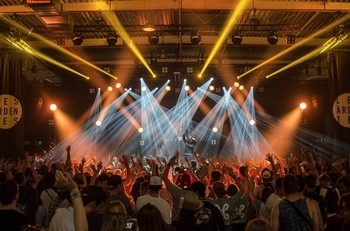
With digital streaming, the fractional publishing royalties that are paid by Spotify and Pandora, and with iTunes making singles dominant over albums after some 35 years, live music is once again the lifeblood of the music industry, along with TV and film licensing. Throughout the 1970s to the 1990s, touring and live performances served to promote album sales. Now, the industry has turned 180 degrees and records and videos support live concert sales.
As the owner of a live music venue, you have certain obligations and responsibilities if you want your business to grow and prosper. Assuming that you have accounted for the legal permits and publisher’s royalty payment agreements to operate your establishment, here are five key implements you will likely want to install in your venue apart from the PA system, mixing console, cabling, lights, and furniture:
Soundproofing
Ever been in a restaurant where the background noise is so loud that you have to yell for the person across the table to hear you? Now, think about how hard it is to hear someone being amplified against a correspondingly loud sonic cacophony.
While it is crucial to control excess sound from leaking out onto the street, soundproofing can also be crucial for helping to make your venue a place where musicians can hear themselves clearly and where your audience can enjoy the acoustics. Creating an acoustic space out of an old cement building might not require much treatment for classical, folk, or jazz music, but for any kind of electric instruments and live drums, the echoes can create havoc and the reverberation from the hard surfaces can render even a super tight band like Bruno Mars’ sound like a muddy din of noise.
Utilizing the proper acoustic treatment to reduce bass traps and excess reverberation, especially for techno, EDM, or other DJ related loud party music, will help to keep your customers happy and recurring.
A Decibel Meter
If your venue is in a zone that borders on residential or has municipal noise limits, a decibel meter will let you know in advance if the volume is getting too high and your risk of getting fined is increasing.
Proper Power Routing and Conditioning
There are many venues that were created out of warehouse spaces, former houses of worship or other kinds of structures in which plentiful and properly grounded electricity was not a priority. Clubs where a scant AC line or two are expected to supply the juice for a 2000 watt + sound system along with a band’s equipment and lighting will inevitably develop ground loop issues, blown circuit generators, potential fires, and other problems. These can be avoided if the investment for proper electric power is matched with the equipment requirements.
Special Effects Systems
Sound and auditory aspects of music aren’t everything. Many shows also have spectacular effects to go along with it. Implement at least some basic effect options for your bands to utilize, or appliances to aid with the effects they bring with them, such as industrial fans to help direct effectual smoke. Fans are also helpful to cool off guests in a hot concert hall. Also, make sure that your electrical system can handle the systems you implement.
ID Verification Scanner
If your venue serves alcohol, you are taking huge risks if you inadvertently serve minors who are under the legal drinking age. Motorola and other companies make portable ID scanners that will take the guesswork out of verifying whether or not an ID is counterfeit, and will also remove the discretion that a door person may exercise that can lose your license if he or she guesses wrong.
Security Cameras
Clubs are notorious for housing illicit activities of many types. NYC’s Limelight was shut down for rampant drug distribution among its patrons. Having security cameras and a recording system will allow you to keep records to assist authorities if needed and provide cover for you and your staff if crimes are committed on your premises by customers.
I hope these few tidbits of advice can be of use for you. Good luck!
